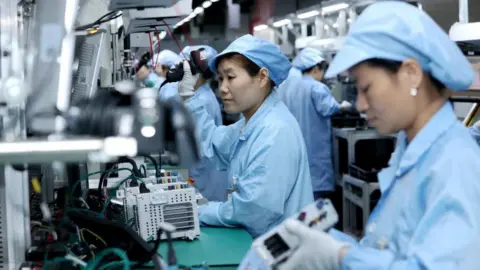China sees the U.S. trade deal as a huge win for Beijing

Quick Read
China sees the U.S. trade deal as a huge win for Beijing
China’s Perspective on the U.S. Trade Deal: A Strategic Victory for Beijing
Introduction
In the intricate web of international trade, deals between superpowers are rarely just about economics. They are symbols of shifting influence, strategic positioning, and long-term national goals. This is particularly true in the case of the recent U.S.-China trade deal, which, while designed to address immediate trade tensions, is being hailed in Beijing as a major geopolitical and economic triumph. From China's viewpoint, this agreement goes far beyond tariff reductions and export quotas—it represents a strategic win in the broader game of global influence.
Understanding the Trade Deal: What Was Agreed?
While the public focus has been on the monetary value and terms of the trade deal, it’s important to unpack the core components that make this agreement significant. Key provisions include:
Increased Chinese purchases of American goods: China agreed to boost its imports of U.S. agricultural, energy, and manufacturing products.
Improved intellectual property protections: China made commitments to curb forced technology transfers and protect foreign business interests.
Tariff reductions: Both sides agreed to roll back some tariffs, easing the pressure on global markets and bilateral relations.
However, the underlying message, especially from China’s perspective, is more strategic than transactional.
Why Beijing Views the Deal as a Victory
1. Economic Flexibility Without Compromise
China was able to secure economic breathing room while giving up relatively little in terms of structural reforms. Although the agreement includes provisions on intellectual property and technology transfer, enforcement mechanisms are seen by some analysts as weak or vague. This allows China to project a cooperative stance while maintaining control over key economic levers.
2. Preserving Political Stability
For the Chinese Communist Party, domestic stability is paramount. The trade war had placed stress on China's economy, risking unemployment and social unrest. By de-escalating tensions with the U.S. through this deal, Beijing buys time to refocus on internal priorities such as technological innovation, industrial upgrading, and domestic consumption.
3. Projecting Strength to Domestic and Global Audiences
Chinese state media has portrayed the deal as evidence of the country’s resilience and negotiating strength. This narrative helps reinforce the government’s legitimacy at home and signals to other nations that China can hold its ground against the world’s largest economy. In a world increasingly shaped by perceptions, this public relations win is almost as important as the economic terms.
4. Buying Time for Long-Term Strategy
Rather than being a final resolution, the trade deal is more of a pause button. It gives China time to continue building up self-sufficiency in areas like semiconductors, AI, and green technologies. By appearing to cooperate with the U.S., China can lower the temperature of international scrutiny while doubling down on its own strategic goals.
Implications for the U.S. and the Global Economy
1. Mixed Reactions from American Stakeholders
While some American farmers and businesses welcomed the deal for opening up Chinese markets, others viewed it as a temporary fix lacking enforceable mechanisms. Critics argue that it does little to address core structural issues in the U.S.-China economic relationship.
2. Global Trade Dynamics in Flux
The agreement may usher in a new era of selective decoupling, where countries seek to reduce their dependence on any single trading partner. While this deal offers short-term relief, the long-term uncertainty remains, particularly as both countries pursue economic nationalism in different forms.
3. A Shift in Global Perception
The world is watching closely. For some emerging economies, China’s handling of the trade dispute enhances its reputation as a steady and strategic player on the world stage. This could influence future alliances, trade partnerships, and diplomatic strategies in Asia and beyond.
Conclusion: A Tactical Win on a Strategic Chessboard
From Beijing’s viewpoint, the U.S.-China trade deal is not just a diplomatic settlement—it is a calculated step forward in China’s long-term plan for global prominence. While the United States may see the deal as a method of rebalancing trade, China interprets it as validation of its resilience, negotiating acumen, and growing geopolitical clout. In the high-stakes game of global influence, this trade agreement marks a moment where China not only held its ground but subtly advanced its position.
As the global order continues to evolve, understanding the strategic layers behind such deals becomes essential—not just for policymakers and analysts, but for anyone invested in the future of international relations.






